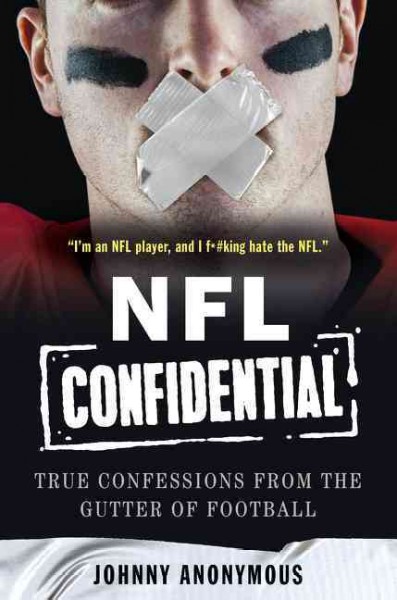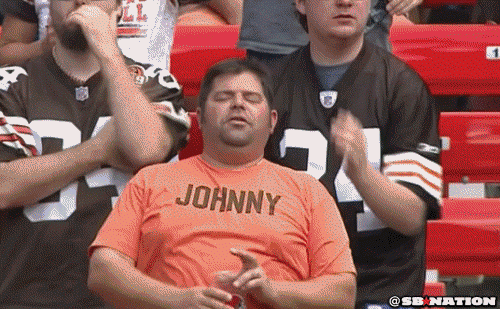by Andrew Hedglin
 Johnny Anonymous, a white offensive lineman in the NFL who wishes to remain, well…anonymous, opens his book NFL Confidential with a pretty audacious challenge: “…I changed a bunch of…names, timeline, details, the usual. All so you can’t figure out who I really am. Go ahead, try. I dare you. Catch me if you can.”
Johnny Anonymous, a white offensive lineman in the NFL who wishes to remain, well…anonymous, opens his book NFL Confidential with a pretty audacious challenge: “…I changed a bunch of…names, timeline, details, the usual. All so you can’t figure out who I really am. Go ahead, try. I dare you. Catch me if you can.”
That’s a short order in the internet age, especially for somebody who plays in the NFL and is so awash in publicly available information, regardless of how unimportant he thinks he is. I won’t link to the page that floats a very convincing theory as to the author’s real identity, but you can find it with a cursory Google search. As I read the book with this person’s identity in mind, it became clear: all the puzzle pieces fit.
But why all the cloak-and-dagger in the first place? What secrets about the NFL is he going to blow open for the reader? Is it any worse than what we already know–concussions, performance-enhancing drugs , franchises extorting money from cities for new stadiums, and domestic violence?
I mean, not really. If there is one thing he focuses on that will probably leave the reader feeling most uneasy, it’s the excruciating toll being a pro football player takes on the bodies and minds of the people who play the sport, both in the short-term of maintaining weight (things get fairly scatalogical) and the dark spectre of long-term damage.
The other thing he seems to hate about the NFL is the insecurity. Certainly, this is ultimately exemplified in job insecurity, especially for players on the margins like him, who are always in danger of getting cut. Even though “scrubs” make hundreds of thousands of dollars per year, that doesn’t always go as far you’d think. Because he only has one year left on his contract, he can’t even get a mortgage for a modest home he tries to buy in a mid-size Midwestern city..
Ultimately, what his frustration with the NFL seems to add up to is the process of dehumanization that it entails. As an NFL player, you are expected to lose your individuality. It’s the flip side of one of the nicer things you could say about sports, specifically football, and especially the offensive line: it gives you a chance to be part of something larger than yourself. But you can say that about many things, and that’s what makes his dilemma so compelling, I think. It’s a ramped-up version of a very human problem.
Often, it seems like the cons outweigh the pros to staying in football for Anonymous. He feels like he should quit, and his hometown girlfriend certainly encourages him to do so. But, ultimately, he’s not Chris Borland, the pomising San Francisco 49ers linebacker who quit the NFL after just one year. Anonymous struggles to rationalize what keeps him playing, settling for a vague mixture of a love of playing and also a vague terror of deciding what he would do otherwise.
This all sounds pretty personal, but it doesn’t really answer what’s with the anonymity. That’s much easier to explain: he writes with the kind of honesty that makes the people around him look human. And, by “human,” I mean it makes the characters who populate this book–the general manager and owner, his coaches, his teammates, and even himself–look like flawed, silly, self-interested, narcissistic jackasses. He also captures their vulnerabilities and fears and jokes intended for private audiences. I mean, it’s kind of what happens when you write a memoir from any walk of life that isn’t overly sanitized for public consumption.
Anonymous is not overly self-serious, so it would feel off-putting to expect him to treat the rest of his world this way. You do get invested in his journey–from his status as ex-mama’s boy who struggles to move on after her death when was in junior high, to his cyclical relationship with his girlfriend, to his his love/hate relationship with his offensive line coach. It’ll matter to you, too, by the end, if you stick with the book–if you’re okay with all the cursing and lack of political correctness/general sense of propriety.

And, though I find the probing of human condition in those around us to be a fascinating and forgiving process lined with the potential for empathy, that’s cold comfort when you are routinely held up for public scrutiny as much as NFL players and coaches are. Especially when we fans and they themselves so often expect them to be more than human. And don’t even get me started on how the NFL is not big on the distractions that this book could generate with sufficient notoriety.
If you’re looking for a gritty exposé on the dark underbelly of the NFL, this book is probably going to waste your time. If you’re looking for a conflicted, fascinating memoir from the perspective of a specific (though representative) NFL player, this book is great. If you enjoy reading ESPN the Magazine or Peter King’s MMQB website, you will probably like this book. I know I did.


Comments are closed.